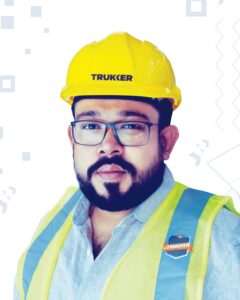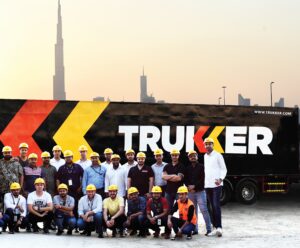
While the global pandemic continues to take a heavy toll on multiple industry sectors, there have been technology-driven paradigm shifts in logistics and supply chain processes and systems thank to the ingenuity and resilience demonstrated by the industry affirms Gaurav Biswas, Founder- CEO, TruKKer the region’s first technology enabled truck aggregator.
The world has changed in multiple ways over the last few months as mankind has been hit by a global pandemic. We underestimated the virus, then were shocked by its spread, then panicked into lock downs and then started to figure out ways to live with it until we find a suitable vaccine to get rid of it. 
During this time however, there have been fundamental shifts in the ways we communicate, educate our young, do business and keep the wheels of supply chain moving. The supply chain and logistics sector has shown great resilience and ability to transform post Covid-19. While most businesses have been shut down, retail has suffered with no physical sales, the logistics sector has continued to support the movement of pharmaceuticals, health care equipment, food and consumer goods across the world.
The rise of e-commerce has accelerated as more of us now order online instead of going to the mall. Again, the logistics providers, while being overwhelmed have continued to deliver to sudden increase in demand from online orders.
Industrial cargo movements will see massive disruptions over the next few years due to efficiencies at ports, shipping lines, road borders and general impact on manufacturing and distribution businesses.
Technology in Road Freight
Technology development and adoption are at an inflection point for the supply chain and logistics sector. The companies and teams that are able to innovate and adapt will end up being the next generation sector leaders and disrupt traditional businesses permanently. Technology will drive the following functions faster than it has ever done before Digitization: More and more consumers, companies and supply chain participants will move towards digitization of all processes and business functions. Logistics is very paperwork heaving. Companies like TruKKer have been pushing towards paperless transactions and this change will now further accelerate. TruKKer has been able to achieve 100% digitization in road freight documentation.
Electronic procurement and use of platforms: There has been significant demand erosion and the impact has made companies more price sensitive. This will give further boost to digital platforms like TruKKer that create the utilization based efficiencies through shared economy principles.
Automation at multiple levels: In the road freight sector, there are multiple tiers of sophistication amongst the various participants. Each party has to be addressed accordingly towards an upgrade of the entire ecosystem. The technology to be developed, adapted and implemented for a truck driver has to be very different to that for an international freight forwarder.
Collaboration through integration: The supply chain industry is one of the most complex with regards to the number of parties that are involved in movement of cargo. To enable technology, frameworks for collaboration have to be created with multiple parties namely customs, port authorities, clients, shipping lines, transporters and other regulators and stakeholders. TruKKer is progressing with multiple collaborations.
New Age: All the hi-tech stuff of new age technology like AI, ML (Machine Learning), Blockchain, IoT and other advanced know-how have applications in road freight and logistics. TruKKer believes that autonomous vehicles will be commercially adapted in trucking much faster than cars.
Impact on the regional transporters
In the MENA region, businesses will have to deal with a double impact of Covid-19 and also low oil prices. As cities and regions come out of lock-downs, there is constant pressure on the health care infrastructure and many businesses continue to operate at lower outputs. The region’s infrastructure spend along with some large government backed projects might face slow down in the medium term with resulting impacts on multiple sectors. As a result, almost every sector will be looking for cost saving measures.
Efficient and technology based operators like TruKKer that are also adequately capitalized to capture market share will benefit and accelerate their growth. In the traditional fleet owning companies, most trucking businesses have recovered since May 2020 as trade and industry start coming back from lock down.
However, the individual owner operators and small road freight brokers involved in the international (cross-border) cargo movement business continue to suffer due to border closures.
The suffering of the UAE transporters has been acute as their jobs have been replaced by the Saudi origin trucks. TruKKer has tried to utilize a lot of such trucks for its other projects and lanes within the UAE including for port movements, especially as many clients have started moving cargo by sea due to restrictions and very high pricing for international road freight. TruKKer estimates that road borders will start relaxing from July 2020 and the sector will have a V-shaped recovery catering to large volumes of cargo waiting to be moved as a result of the pent-up demand in Q2- 2020.
Competition and structure
The road freight sector is extremely fragmented across the world and the MENA region is no different. There are thousands of individual owner operators, along with similar fragmentation in the brokerage business. The MENA full truck load (FTL) sector is highly competitive and analytical information is missing almost in its entirety. The large fleet owners make less than five percent of the total supply of trucks and they control the long term contracts with large enterprise clients. Small fleet owners and single owner operators service as sub contractors to large fleet companies or freight forwarders and other brokers.
Digital freight platforms like TruKKer are disrupting this industry structure by enabling the small transporters and individual owner operators with advanced tools, technology interfaces and sophisticated customer service to service the large enterprise clients and SMEs with standard service quality and much better pricing.
Technology triumph
The technology allows for significantly leaner operations and ability to scale across markets and geographies. TruKKer is constantly automating its processes and also its interface with demand and capacity along with addressing every friction in the transactional process. Execution focus is the key to success at TruKKer. Technology is an enabler but nothing is more important than operational and process excellence in logistics.
TruKKer has been investing heavily into the supply infrastructure and driver welfare to ensure that one of the hardest jobs is acknowledged. Over the next few months, TruKKer will be announcing major programs focused on driver welfare and infrastructure for enhanced cargo safety and security.
Digital freight platforms like TruKKer are transforming the fragmented, unorganized and inefficient road freight sector into reliable, standardized, and optimized services with significant commercial and environmental benefits for the entire ecosystem.






